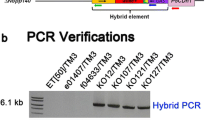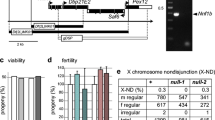Abstract
The Cbf5 protein of Saccharomyces cerevisiae was originally identified as a low-affinity centromeric DNA-binding protein, and cbf5 mutants have a defect in rRNA synthesis. A closely related protein from mammals, NAP57, is a nucleolar protein that coimmunoprecipitates with the nucleolar phosphoprotein Nopp140. To study the function of this protein family in a higher eukaryote that is amenable to genetic approaches, the gene encoding a Drosophilamelanogaster homolog, Nop60B, was identified. The predicted Drosophila protein shares a high degree of sequence identity over a 380-residue region with both the mammalian and yeast proteins, and shares several conserved motifs with the prokaryotic tRNA pseudouridine 55 synthases. Nop60B RNA is found at high levels in nurse cells and in the oocyte, and is present throughout development. Nop60B protein is localized primarily to the nucleolus of interphase cells, and is absent from the chromosomes during mitosis. Nop60B mutants were generated and shown to be homozygous lethal. The Drosophila gene can rescue the lethal phenotype of yeast cbf5 mutations, showing that the function of this protein has been conserved from yeast to Drosophila.
Similar content being viewed by others
Author information
Authors and Affiliations
Additional information
Received: 23 February 1998 / Accepted: 17 June 1998
Rights and permissions
About this article
Cite this article
Phillips, B., Billin, A., Cadwell, C. et al. The Nop60B gene of Drosophila encodes an essential nucleolar protein that functions in yeast. Mol Gen Genet 260, 20–29 (1998). https://doi.org/10.1007/s004380050866
Issue Date:
DOI: https://doi.org/10.1007/s004380050866




